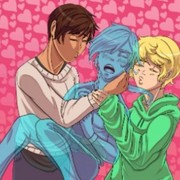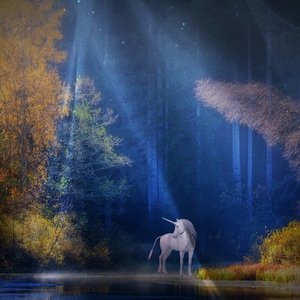John woke when the bells of St Martin’s struck midnight.
“John.” He heard his mother speaking as if from a long way off, and surfaced blearily into rushlight. “John, it’s time.”
Behind her voice he heard the deep-throated clong! clong! clong! of Great Harry striking midnight from the little limestone church down in the valley. When the bell finished shaking the air, silence returned to the village street save for a sleepy clucking of Goody Kirkland’s hens. Starlight stole in through the tiny open window of his garret. John swung his feet onto the rush-strewn floor and rubbed grit out of his eyes. He was cruelly sleepy; the last few hours seemed to have left him tireder than when he lay down, and for a moment this midnight wayfaring seemed to him not merely perilous but also hopeless.
“John,” his mother said with a sigh, “must you go out again?”
Must he, indeed? When he could roll back into his bed, and wake tomorrow on a summer’s morning to horseshoes and broken ploughs in the smithy, to the faces of friends passing by with a nod and a greeting—
“You know I must.”
“When she has used you so ill.”
He had no answer to that, beyond a guilty sense that he must not have been so calm and clear as he prided himself in being, that first night, when he came home and told her what had happened. To cover his confusion he pulled his shoes out from under the bed, yanked them onto his feet and tied the latchets.
Behind the rushlight, his mother’s face was strained with the effort to suppress her fear. “Because you love her?”
He rested his elbows on his knees and yawned. That was worse: a trickster question, changing shape each way he looked at it.
“No, Mam,” he said at last. “Not because I love her, but because I promised.” His conscience pricked him again, and he lifted his hand in a futile gesture. “It all depends on what you mean by love.”
“Can you not live without her? It is—oh, John! It is so dangerous.”
“If it puts you at ease, it is the Rose I am going to find. Not Janet. Now I pray you, let me dress.”
He followed her downstairs a few years later and found his younger brother Ned sitting at the trestle-table in the kitchen with his feet propped up on the bench opposite. He stifled a yawn when John came in and said, “I went up the cliff path an hour ago, and there were lights shining in the wood. If you go now you’ll find them.”
“Good.” John had never liked to make long speeches. “Farewell again, Mam. Pray for me. If I’m not home by dawn, Ned, light the forge and see to the day’s work. Master Fuller has promised me you’ll not want for charity nor counsel. God by you.”
“And by you.”
Outside, the cool air cleared his head a little, though his eyes still felt hot and gritty. The night was not dark, and as his eyes adjusted to the light of the half-moon, he could pick out the pale ribbon of the road that ran up the dale, and the little row of silver-grey limestone houses huddled under a cliff of the same stone.
John turned off the road and took the cliff path, a narrow gravel track leading up the face of the rock, out of Middleton Dale into the high forest.
Was it only four days since he and Janet had come this way together?
Again, his mind winced away from the memory. Four days ago. Before the dream which had set his feet on this path. Before the tower and the owl.
Before the Unicorn and the Rose.
Before he lost her. If she had ever really been his at all.
He reached the top and saw the lights shining faintly from far away in the heart of the wood, as Ned told him. If he stood very quietly, he could hear the lilt of bagpipes and a beating of drums.
He turned his back on them and looked down at Middleton Dale.
It was all spread out at his feet, the far hills, the little dark Dale Brook set in a skein of rolling meadowland, a huddle of sheep in one of the Dovewater Farm pens. A white ribbon of road ran up the valley and vanished into the cluster of beech-trees from which the bells of St Martin’s—his old friends George, Douce, and Great Harry—had rung prayers every day of his life, calling him to morning labour, noonday meal, and evening rest. Higher up, huddled on a series of terraces under the limestone cliff, white houses slept under dark slaty roofs.
John let out a long breath.
A rasping voice broke into his thoughts.
“Even if you come back in safety, it will not be the same again.”
John jumped and turned, his hand going to the knife in his belt and his eyes to the dark shadow which sat huddled at the foot of an oak-tree. When his eyes adjusted to the darker shadows of the greenwood, he saw by the glint of the moonlight in a long white beard that it was the old man the children called Simple Alf.
The old man who told such tall tales of Faerie. At whom John had laughed all his life, as he laughed at the fearful folk who left a dish of milk on the back stoop for the Lordly Folk to drink, or Goody Whitemare with her wart-charms and love-philtres.
He was not laughing now.
He let go of his knife. “Nor was it the same for you. Was it?”
“No.”
He turned back to the Dale, trying to drink his fill of it, this last time of all.
“Nevertheless I must go,” he said. “Have you any counsel for me, Goodman Alf?”
“Aye,” the old man croaked. “I will tell you how to return in safety. Make no covenants with the Lordly Folk, young master smith! Drink no cup. Bite no sup.”
“Spend no coin,” John finished. It was a litany he had often heard. “My thanks.”
There was no use in drawing it out any longer. He loosened his knife in its sheath and turned toward the forest. Within five years the trees crowded around him, blotting out the stars, and he knew he was in Faerie.











Comments (0)
See all